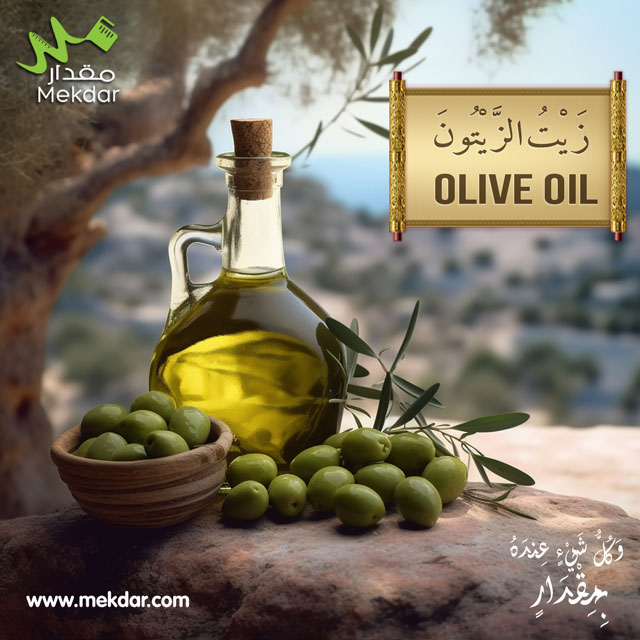د. وليد فؤاد
فوائد زيت الزيتون للصحة والتغذية: دليل شامل ... مع مقدار
The Health and Nutrition Benefits of Olive Oil overview by Mekdar.com
The Health and Nutrition Benefits of Olive Oil - فوائد زيت الزيتون للصحة والتغذية: دليل شامل
اكتشف فوائد زيت الزيتون الرائعة للصحة والتغذية مع دليلنا الشامل. تعرّف على أحدث الأبحاث والنتائج المبنية على الأدلة |
|||
|
يعد زيت الزيتون من أكثر الزيوت الصحية والمفيدة للجسم. حيث يحتوي زيت الزيتون على العديد من المركبات الغذائية المفيدة والتي تساهم في صحة الجسم والحماية من العديد من الأمراض. في هذا المقال، سنتعرف على فوائد زيت الزيتون للصحة والتغذية بشكل مفصل.
|
|||
|
|
|
|
|
|
|
|
|
ذكر " زَيْتُ الزَّيْتُونَ " فى القراآن الكريم، فى سورة الْنور (٢٤) آية ٣٥ و من المرجح ان الشجرة المقصودة فى القراآن الكريم، فى سورة المؤمنون (٢٣) آية ٢٠ هى شجرة "الزَّيْتُونَ" و "الدُّهْنِ" هو " زَيْتُ الزَّيْتُونَ " |
|
|
نبذة تاريخية يعتبر زيت الزيتون جزءًا من النظام الغذائي المتوسطي الذي يعتبر أحد أفضل النظم الغذائية الصحية في العالم. حيث تم استخدام زيت الزيتون لآلاف السنين في العديد من الحضارات والثقافات المختلفة. يحتوي زيت الزيتون على العديد من العناصر الغذائية المفيدة والتي تساعد في الحفاظ على الصحة والوقاية من العديد من الأمراض.
|
|
القيمة الغذائية
يحتوي زيت الزيتون على نسبة عالية من الدهون الأحادية غير المشبعة التي تعتبر أكثر صحية للجسم. كما يحتوي زيت الزيتون على مضادات الأكسدة والتي تساهم في الحماية من الأمراض المختلفة. كما يحتوي زيت الزيتون على العديد من الفيتامينات الأساسية مثل فيتامين هـ والذي يساعد في الحماية من الأمراض القلبية والأوعية الدموية. كما يحتوي زيت الزيتون على العديد من المركبات النباتية المفيدة مثل البوليفينولات والتي تساعد في الحماية من الالتهابات والأمراض المزمنة.
فيما يلي بعض الأسباب الرئيسية التي تجعلك تدرج زيت الزيتون في نظامك الغذائي:
١. زيت الزيتون غني بالدهون الصحية الأحادية غير المشبعة. على عكس الدهون المشبعة ، التي يمكن أن ترفع مستويات الكوليسترول لديك وتزيد من خطر الإصابة بأمراض القلب ، يمكن للدهون الأحادية غير المشبعة أن تخفض كوليسترول البروتين الدهني منخفض الكثافة "الضار" وتزيد من نسبة الكوليسترول الحميد "الجيد". يمكن أن يساعد ذلك في منع تراكم الترسبات في الشرايين وحماية قلبك من التلف. حمض الأوليك ، وهو الدهون الأحادية غير المشبعة الرئيسية في زيت الزيتون ، له أيضًا خصائص مضادة للالتهابات وقد يعدل بعض الجينات المشاركة في تطور السرطان.
٢. يحتوي زيت الزيتون على مضادات الأكسدة القوية. مضادات الأكسدة هي مواد يمكنها تحييد الجذور الحرة ، وهي جزيئات غير مستقرة يمكن أن تسبب الإجهاد التأكسدي وتتلف خلاياك. يرتبط الإجهاد التأكسدي بالشيخوخة والأمراض المزمنة والالتهابات. يعتبر زيت الزيتون مصدرًا رائعًا لمضادات الأكسدة ، مثل فيتامين هـ وفيتامين ك والبوليفينول والفيتوستيرول. يمكن أن تساعد مضادات الأكسدة هذه في حماية خلاياك من الإجهاد التأكسدي ، وتقوية جهاز المناعة ، ومنع تخثر الدم ، وتقليل الالتهاب.
٣. زيت الزيتون قد يساعد في منع الجلطات. تحدث السكتات الدماغية بسبب اضطراب تدفق الدم إلى الدماغ ، إما بسبب جلطة دموية أو نزيف. يمكن أن تؤدي السكتات الدماغية إلى تلف الدماغ أو الإعاقة أو الوفاة. قد يساعد زيت الزيتون في منع السكتات الدماغية عن طريق تحسين ضغط الدم ومستويات الكوليسترول ، وكذلك عن طريق منع تخثر الدم والالتهابات. أظهرت العديد من الدراسات أن الأشخاص الذين يستهلكون المزيد من زيت الزيتون لديهم خطر أقل للإصابة بالسكتة الدماغية من أولئك الذين يستهلكون أقل أو لا يستهلكون على الإطلاق.
٤. زيت الزيتون يقي من أمراض القلب. أمراض القلب هي السبب الرئيسي للوفاة في جميع أنحاء العالم. وهو ناتج عن عوامل مختلفة ، مثل ارتفاع ضغط الدم ، وارتفاع الكوليسترول ، والسكري ، والسمنة ، والتدخين ، وقلة النشاط البدني. يمكن أن يساعد زيت الزيتون في تقليل خطر الإصابة بأمراض القلب عن طريق تحسين العديد من عوامل الخطر هذه. على سبيل المثال ، يمكن لزيت الزيتون أن يخفض ضغط الدم عن طريق إرخاء الأوعية الدموية وتحسين تدفق الدم. يمكن أن يحسن أيضًا حساسية الأنسولين ومستويات السكر في الدم ، والتي يمكن أن تمنع أو تتحكم في مرض السكري. بالإضافة إلى ذلك ، يمكن أن يساعدك زيت الزيتون في الحفاظ على وزن صحي من خلال توفير الشعور بالشبع وتقليل الجوع والرغبة الشديدة.
٥. زيت الزيتون قد يحارب مرض الزهايمر. مرض الزهايمر هو اضطراب عقلي تدريجي يسبب فقدان الذاكرة وتدهور الإدراك وتغيرات سلوكية. إنه السبب الأكثر شيوعًا للخرف بين كبار السن. لا يوجد علاج لمرض الزهايمر ، لكن بعض العلاجات قد تبطئ تقدمه أو تخفف من أعراضه. قد يكون زيت الزيتون أحد هذه العلاجات ، حيث ثبت أن له تأثيرات اعصاب في الدراسات التي أجريت على الحيوانات والبشر. تتمثل إحدى الآليات التي قد يحارب زيت الزيتون من خلالها مرض الزهايمر في الحد من تراكم لويحات بيتا أميلويد في الدماغ ، والتي تعد السمة المميزة للمرض.
٦. زيت الزيتون قد يدعم صحة العظام. صحة العظام مهمة للوقاية من الكسور وهشاشة العظام والأمراض الأخرى المرتبطة بالعظام. تعتمد صحة العظام على عوامل مختلفة ، مثل تناول الكالسيوم وحالة فيتامين د ومستويات الهرمونات والنشاط البدني والوراثة. قد يلعب زيت الزيتون أيضًا دورًا في صحة العظام من خلال تحفيز تكوين العظام والتمعدن. اقترحت بعض الدراسات أن استهلاك زيت الزيتون قد يزيد من كثافة العظام ويقلل من فقدان العظام لدى كبار السن.
٧. زيت الزيتون قد يفيد صحة الجلد. تتأثر صحة الجلد بالعديد من العوامل ، مثل التغذية ، والترطيب ، والتعرض لأشعة الشمس ، والتلوث ، والإجهاد ، والشيخوخة. لا تؤثر صحة الجلد على مظهرنا فحسب ، بل تؤثر أيضًا على حمايتنا من العدوى والإصابات. قد يفيد زيت الزيتون صحة الجلد من خلال توفير الترطيب والتغذية ومضادات الأكسدة والعوامل المضادة للالتهابات. يمكن استخدام زيت الزيتون موضعياً لترطيب البشرة الجافة وشفاء الجروح وعلاج حب الشباب والأكزيما والصدفية وأمراض الجلد الأخرى.
ومع ذلك ، ليست كل زيوت الزيتون متشابهة. أفضل أنواع زيت الزيتون جودة هو زيت الزيتون "البكر الممتاز" ، والذي يتم الحصول عليه من أول عصر بارد للزيتون الطازج ولم يتم تكريره أو تغييره بالحرارة أو المواد الكيميائية.
يحتوي زيت الزيتون "البكر الممتاز" على أعلى كمية من مضادات الأكسدة وأقل مستوى حموضة مقارنة بأنواع زيت الزيتون الأخرى.
أقرأ أيضا عن: الفوائد الصحية للزيتون
الخاتمة
يمكن القول إن زيت الزيتون يحتوي على العديد من العناصر الغذائية المفيدة والتي تساهم في الحفاظ على الصحة والوقاية من العديد من الأمراض المختلفة. فوائد زيت الزيتون للصحة والتغذية مدعومة بالعديد من الأبحاث والدراسات العلمية، مما يجعله أحد أكثر الزيوت الصحية والمفيدة للجسم. لذلك، ينصح بتناول زيت الزيتون بشكل منتظم كجزء من النظام الغذائي الصحي والمتوازن.
تحميل تطبيق مقدار للهواتف الاندرويد
تحميل تطبيق مقدار للهواتف الآيفون
Discover the incredible health and nutrition benefits of olive oil with our comprehensive review. Learn about the latest research and evidence-based findings.

10 Apr 2023
by:











